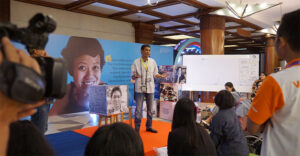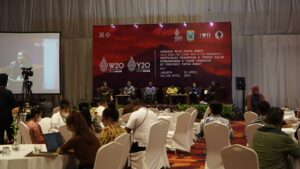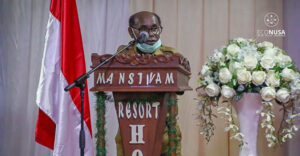
The Kombai indigenous people are fighting for the right to manage customary forests to protect their valuable food source, sago. Sago is one of the staples of people in Papua. Not only that, there are philosophical values of culture and customs in them, such as planting, maintaining until reaping sago.
In commemoration of the International Indigenous People’s Day, the Kombai Indigenous people voiced their struggle to obtain customary forest management rights by organizing the Sago Caterpillar Festival which was presented at the Papuan People’s Environmental Discussion (Lingkar) held in Jakarta (10/8).
Present as speakers were Kristian Ari, Director of the Silva Papua Lestari Association (PSPL), Yambumo Kwanimba, Head of the Sago Kombai Caterpillar Festival which is a representative of the Kombai Tribe, Yuli Prasetyo Nugroho, Head of Sub-Directorate for the recognition of the Customary Law Community and Protection of the Local Wisdom of the Ministry of Environment and Forestry (KLHK) Republic of Indonesia at the Directorate of Conflict Tenure and Indigenous Forest Management, Director General of Social Forestry and Environmental Partnerships.
The Kombai indigenous community is one of the people in the land of Papua who has sufficiently maintained local wisdom, one of which is the Sago Worm Party. To preserve this local wisdom, the Kombai indigenous people see the need to hold a traditional festival. The Sago Caterpillar Festival will be held on September 26, 2018 in Kampung Uni, Bomakia District, Boven Digoel Regency, Papua.
There are three important elements in this festival, namely Indigenous Peoples, Forests and Sago. However, the three are currently threatened because there is no recognition of customary forests.
“Because there are still traditional rituals in the forest, and it is still closely related to forest resources, for example sago, if the forest is threatened then sago is threatened, so the source of community’s livelihood is the Forest. Imagine if the festival was still being held, meaning that it needed a lot of sago, if there was land conversion, there would be a threat to food and culture from the Kombai tribe, “said Kristian Ari.
The Kombai community’s traditional forest is currently under threat from the expansion of the surrounding forest. Like from Industrial Plantation Forest (HTI), Forest Entrepreneur’s Right (HPH) and conversion of forest to oil palm. PT. Digoel Daya Sakti and PT. Damai Setiatama Timber as a Forest Management Rights company in the New Order era had been operating from the 1980s and in the 1990s had left their concession area in the customary territory of the Kombai people. Currently the Kombai indigenous people are struggling to have forest management rights through the Social Forestry (customary forest) scheme.
Many stages have been passed, such as mapping of customary territories, filling out application forms and making local regulations (PERDA). While the process is ongoing, the community is also challenged because the process in the Regional Government itself is still constrained by the issuance of PERDA, the recognition of indigenous peoples and their customary rights.
Yuli Prasetyo Nugroho said that the Sago Caterpillar Festival to be held by the Kombai and Korowai Tribe is one of the important pillars in the Unitary State of the Republic of Indonesia (NKRI). Therefore, the customary law community there must be protected. “So the Provincial and Regional Governments are important to carry out this recognition process. The point is that recognition is a necessity that must be done by the Central, Provincial and Regency Governments, “he explained.
He ensured that the inevitability was actually guaranteed by existing laws. In the discussion he mentioned starting from the Basic Law, the Forestry Law, to the Law on Management and Environmental Protection. “I think we at the LHK Ministry and the provincial friends are ready to work together to ensure that recognition,” Prasetyo said.
The Head of the Sago Caterpillar Party, Yambumo Kwanimba said that sago is a daily food for the Kombai and Korowai tribes, so that forest preservation means also preserving sago. There is a food side, there is a family side as well, this party will show how we as a unitary tribe work together to look after each other’s food needs. Maybe there is one family that can harvest a little, it will be covered by those who can harvest a lot.
The plan is that the Sago Caterpillar Festival will also present traditional dances from the people from 14 villages present. In this festival there will also be a traditional market where people can trade through barter. In addition to the community, the Festival will also be attended by the central government, regional governments, the media, and also foreign tourists. The more elements present, it is hoped that greater support for the Kombai indigenous community in continuing its struggle to obtain customary forest rights.




